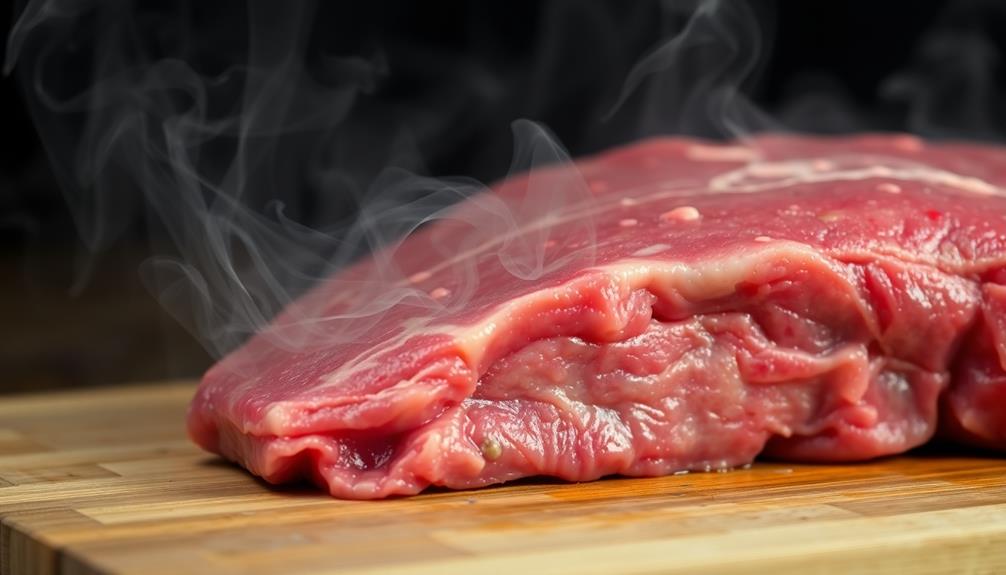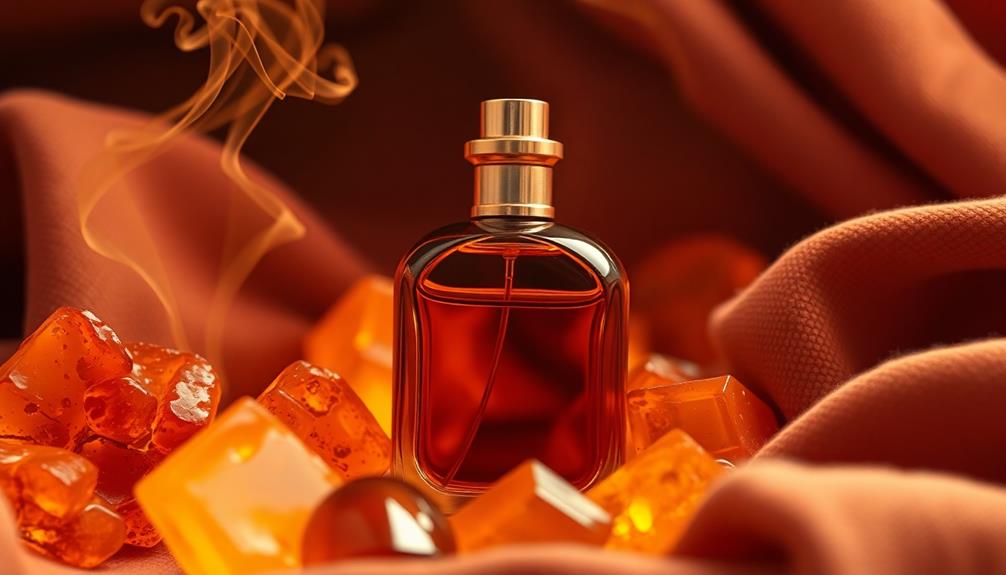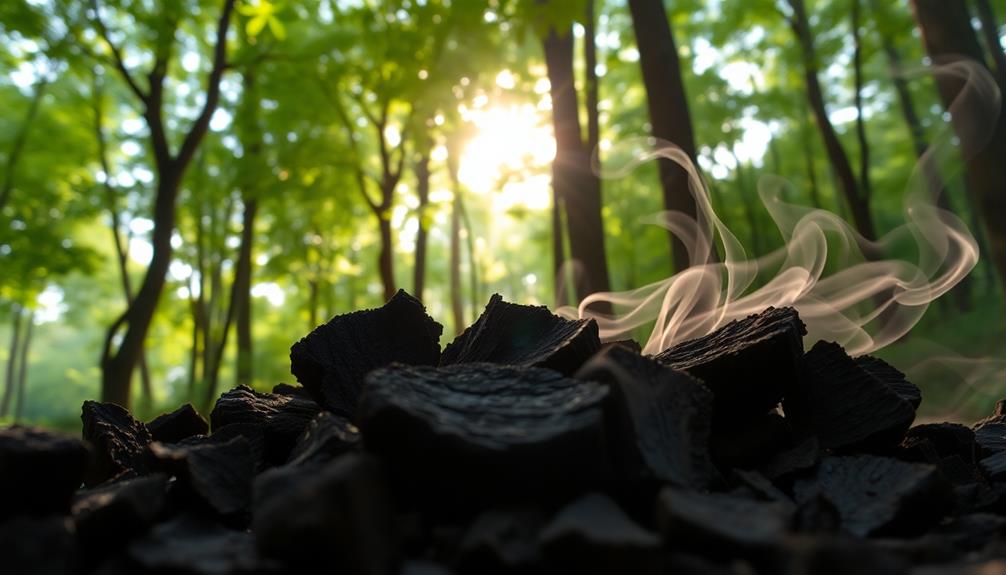Bad beef has a really strong, nasty smell that's hard to ignore! It might remind you of ammonia mixed with something rotten. Instead of the fresh, meaty scent you expect, spoiled beef smells sour and rancid, like it's gone bad. If you catch a whiff of a tangy or putrid odor, it's a sign that bacteria are working away. This can happen when the meat is left out too long or isn't stored properly. Always trust your nose to keep safe from foodborne illness! Curious about how to spot spoiled meat? There's even more to discover!
Key Takeaways
- Bad beef emits a strong, unpleasant odor resembling a mix of ammonia and sulfur, indicating spoilage.
- Spoiled beef has a sour, rancid smell that intensifies over time due to bacterial activity.
- Fresh beef should smell mild and inviting, while spoiled beef has a distinctly off-putting scent.
- Vacuum-sealed beef may release foul odors upon opening, especially after long storage.
- Trust your sense of smell; strong, unusual odors from beef signal potential health risks and spoilage.
Introduction
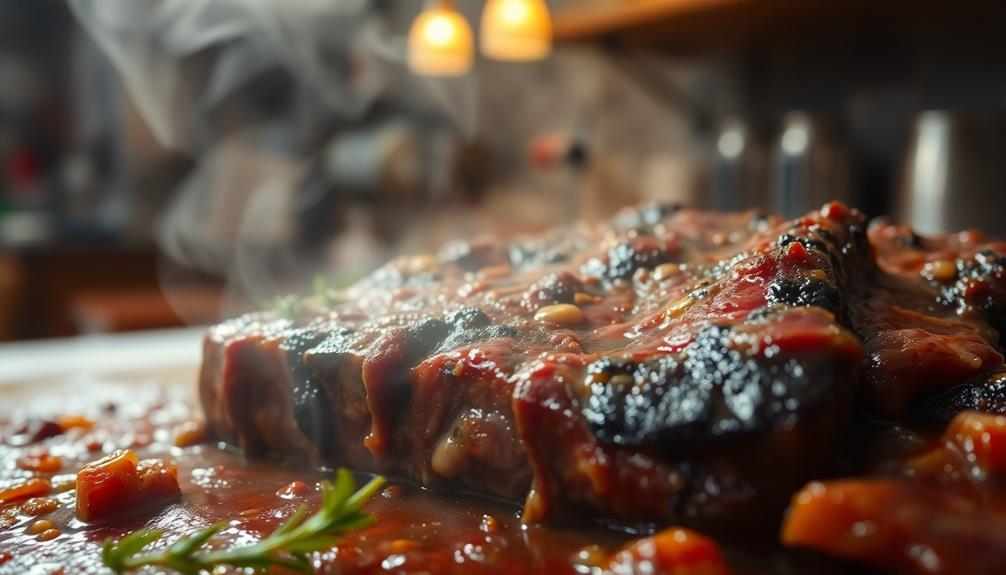
When you open your refrigerator and catch a whiff of something off, it's crucial to pay attention. That strange smell might be a sign of bad meat, especially spoiled beef.
Fresh beef usually has a mild, meaty aroma that makes your mouth water, but spoiled beef smells really unpleasant, like a mix of ammonia and sulfur. It's a stink that you can't ignore! If you notice any hint of this foul odor, it’s a strong sign that the beef is no longer safe to eat. Similarly, just like bad salmon smell indicators, spoiled beef will also develop a slimy texture, indicating bacterial growth. Always trust your senses when assessing whether your meat is past its prime!
This nasty odor happens because of certain compounds, like cadaverine and putrescine, that form when meat goes bad.
Even if the beef looks fine, a strong smell change should make you worry about food safety. Recognizing these odors is super important to keep you from getting sick.
Description of the Smell
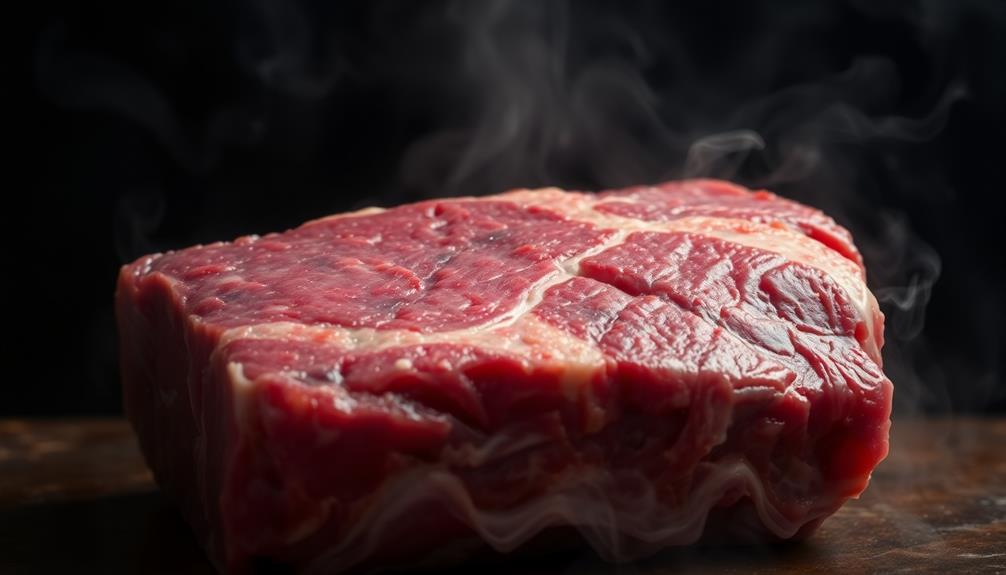
Spoiled beef's smell is unmistakable and can hit you like a brick wall. When you get a whiff of spoiled ground beef, it's not like the fresh, meaty aroma you expect. Instead, it often stinks like something sour and rancid, almost like ammonia or sulfur.
You might notice that the smell gets stronger and more putrid as time goes on. This nasty odor is a clear sign that harmful bacteria are at work, breaking down the meat.
If you just opened a vacuum-sealed package and catch a faint smell, don't worry too much; that can be normal. But if you detect a strong, rancid odor, that's your cue to toss it out! Fresh ground beef should smell pleasant and inviting, while spoiled beef will have an off-putting scent that's hard to ignore.
The bad smell comes from something called volatile compounds, like cadaverine and putrescine, which are produced when proteins break down. These compounds are often associated with the decomposition of animal tissue, which can make spoiled meat, including bacon, smell particularly unpleasant. As these volatile compounds accumulate, they create a distinct odor that is one of the clearest signs of spoilage. Knowing how to identify bad bacon is crucial to avoid foodborne illness — look for a sour or rancid smell, slimy texture, and discoloration, as these are all indications that the bacon has gone bad.
Source and Composition
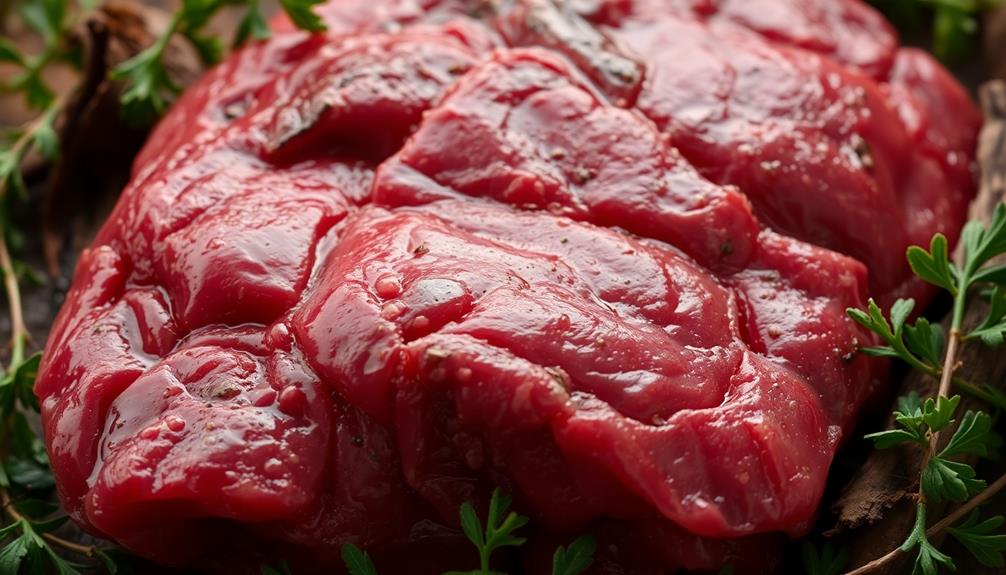
The source of that unpleasant smell from bad beef lies in the breakdown of proteins by spoilage bacteria. When beef starts to spoil, these tiny bacteria get to work, breaking down the meat and creating gases that make the smell really strong.
You might notice a scent that reminds you of ammonia or sulfur, and that's a clear sign something's not right!
As the beef decomposes, specific compounds like cadaverine and putrescine are produced, which are responsible for that yucky odor. Fresh beef usually has a nice, mild, meaty aroma, but when it's spoiled, the smell changes dramatically.
It can become sour or rancid, warning you that it mightn't be safe to eat.
If you ever notice a strong smell that's different from fresh beef, that's your cue to be careful! Spoiled meat can lead to foodborne illnesses, which are no fun at all.
Typical Scenarios or Environments
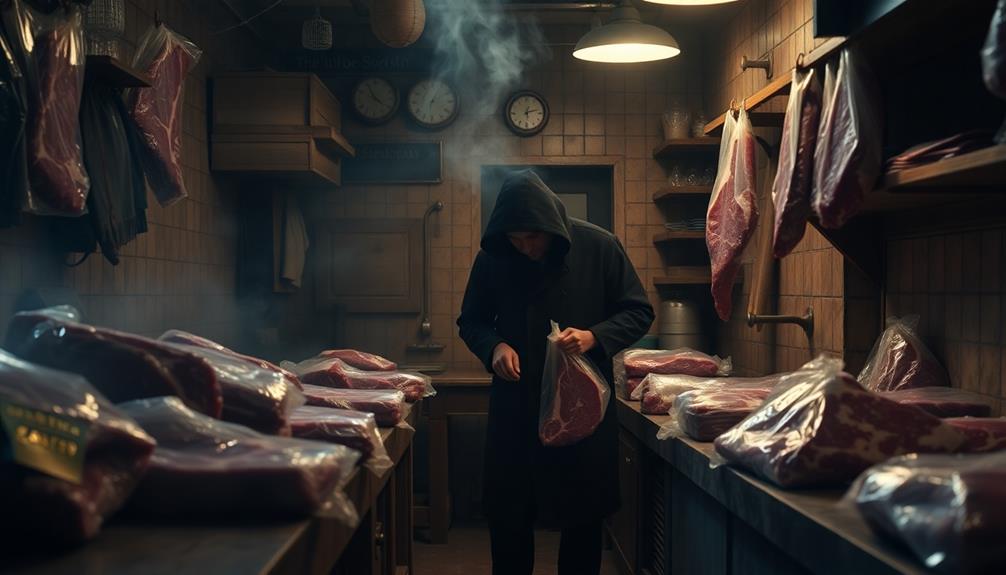
Although many people store beef in their refrigerators without a second thought, improper handling can lead to unpleasant surprises. If you leave beef out at room temperature for too long, it can spoil quickly. You might notice a bad smell that's super strong and makes you wrinkle your nose. It's like a mix of ammonia or sulfur, and it's definitely not something you want to smell while cooking!
In the refrigerator, spoiled beef can develop a rancid smell. This odor can be so overpowering that it hides the lovely scents of other foods nearby. Fresh beef usually has a nice, mild aroma, but when it goes bad, it turns tangy or even putrid. Yikes!
If you've vacuum-sealed beef for a long time, be careful when you open it. A foul odor will greet you, letting you know it's time to toss it out.
Emotional or Cultural Associations

Bad beef smells can stir up intense emotions and cultural reflections. When you catch a whiff of spoiled meat, it might make your stomach turn and trigger feelings of disgust. This smell often turns you off from food, especially meat, making you less eager to eat.
In many cultures, the smell of rotten beef is tied to the idea of food waste and bad health, which can influence your choices at the dinner table. In some places, the aroma of fresh meat is celebrated, while spoiled beef is seen as disrespectful to food. This shows how important quality and freshness are in different cultures.
When you smell that unpleasant odor, it can also make you feel uneasy about food safety and hygiene. You might worry about cooking it or serving it to friends and family.
Additionally, a strong, rancid smell from bad beef can remind you of the risks of foodborne illnesses. This makes people extra careful in selecting and storing their meat to ensure health and safety.
Health or Safety Considerations
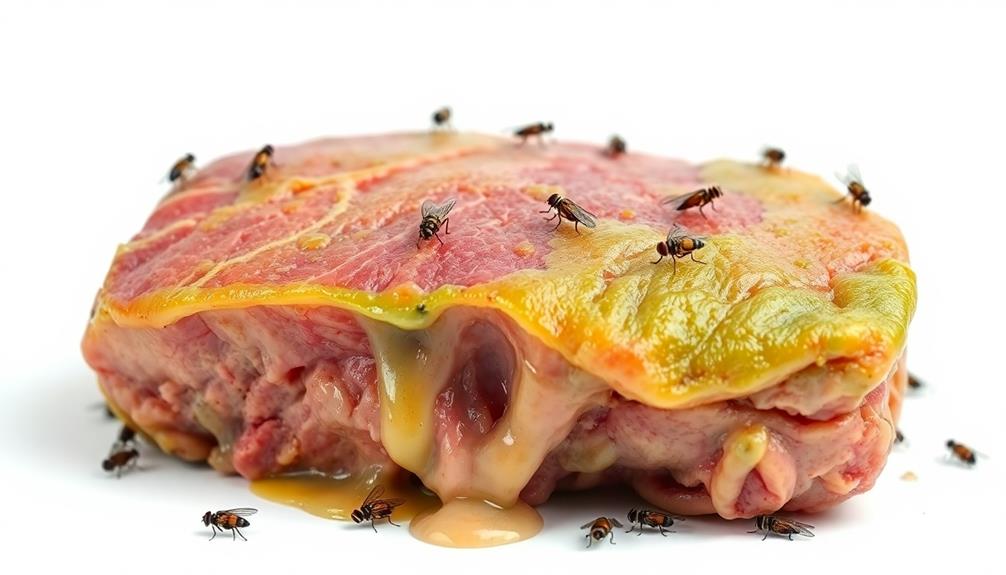
Spoiled beef poses serious health risks that you can't ignore. When you smell beef that has a strong, unpleasant odor, like ammonia or sulfur, it's a big sign that it's spoiled. Fresh beef should smell mild and meaty, but if you notice a rancid or sour smell, it's time to throw it away. That spoiled ground beef might look okay, but don't be fooled!
Cooking spoiled beef doesn't make it safe. Even if you cook it, harmful toxins can still cause food poisoning, leading to nasty symptoms like nausea, vomiting, and diarrhea. You definitely don't want to feel that way! Always trust your sense of smell. If the beef smells off or makes your nose wrinkle, it's safer to toss it out.
Taking care of your health is super important, and avoiding spoiled beef is a simple way to do that. Remember, it's better to be safe than sorry when it comes to food safety.
Final Thoughts
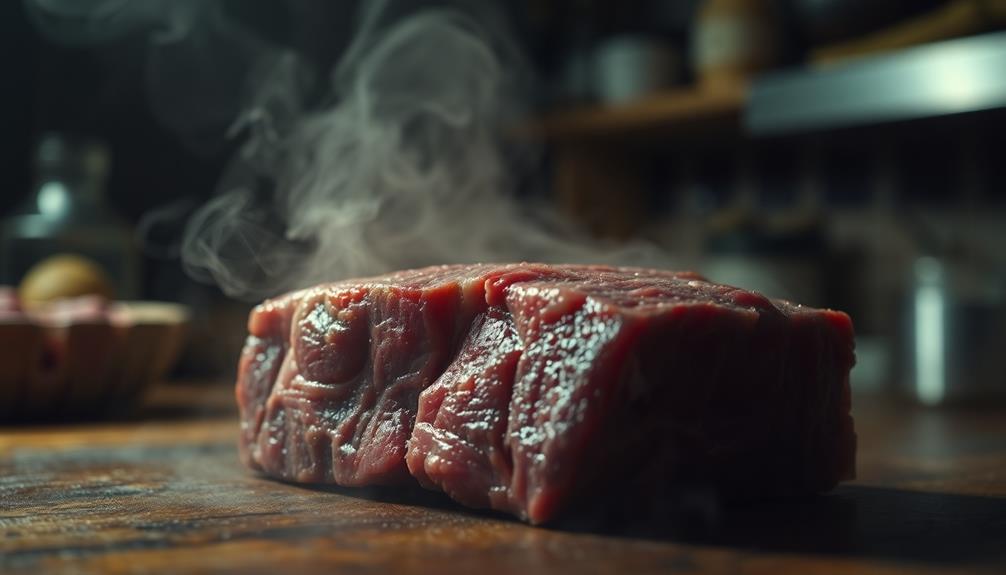
When it comes to beef, your sense of smell is your best friend. Fresh beef usually has a mild, meaty aroma, while bad beef gives off a strong, putrid smell that can remind you of ammonia or sulfur. This is a clear sign of spoilage!
If you notice any sour or rancid odors, it's a warning that the beef mightn't be safe to eat. Those funky smells mean bacteria could be growing, and you definitely don't want to risk getting sick.
Always pay attention to how the beef smells when you buy it. If you catch a whiff of something off after bringing it home, that's a critical indicator that it's time to say goodbye to that beef. Trust your nose! If it smells bad, it's better to toss it out than to take a chance on foodborne illness.
In the end, being cautious about the signs of spoilage will keep you and your loved ones safe.
Frequently Asked Questions
Is It Okay to Eat Beef That Smells a Little?
It's not always safe to eat beef that smells a little. Even a mild odor can indicate spoilage. Trust your instincts, and if you're unsure, it's better to discard it than risk your health.
How Can You Tell if Beef Is Spoiled?
You can tell beef is spoiled by checking for strong, unpleasant odors, slimy texture, or discoloration. If it smells off or looks different, it's best to discard it to avoid health risks.
What Does Rotten Beef Smell Like?
When you encounter rotten beef, you'll notice a strong, pungent odor, often reminiscent of ammonia or sulfur. It's a clear sign of spoilage, making it crucial to avoid consuming any affected meat.
How to Tell if Ground Beef Is Bad?
To tell if ground beef is bad, check its texture and color. If it's slimy or discolored, trust your instincts. Always smell it; a strong, sour odor means it's time to throw it away.
